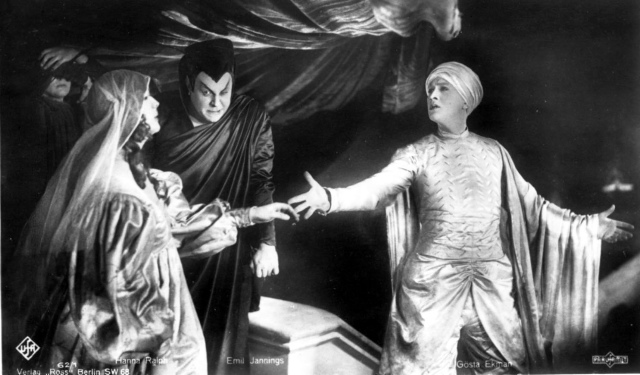FAUST (1926,1 hr 46 min)
F. W. Murnau, Director; Cinematography, Carl Hoffmann, Cinematography; Karl Freund, Camera; Sets and costume design, Robert Herlth and Walter Röhrig, Werner Richard Heymann, original composer. This was Murnau’s last film before he emigrated to California, where he made another four films, including Sunrise, before his death in 1931 in a car crash.
A new score composed by Jean Hasse
Premiered by the South West Ensemble (CoMA South West and Bristol-based players - 23 musicians)
John Traill, Conductor
Saturday 13 October 2007
Victoria Rooms, Queens Road, Clifton, Bristol
Sunday 21 October
Barbican Centre, Cinema 1, London (Silent Film and Live Music Series)
The screenings featured the domestic German print of the FAUST film, from the Masters of Cinema Series/Eureka DVD.
Bristol Silents have been programming Silent Film events in the South West and across the UK since 2000, including the Slapstick Silent Comedy Festival. They’ve helped create a great buzz about silent films in the South West and around the UK. CoMA South West have been playing together for several years, including accompanying other silent films.
The FAUST project was funded in part by: Arts Council England and The Britten-Pears Foundation.
A DVD of FAUST with the premiere recording is available from VM for non-broadcast purposes.
FAUST review from the EPIGRAM,
Bristol University's Independent Student Newspaper / 22 October 2007
SIlent movie, shrilling music
Film is not something you expect to be covered in a music section, a silent film less so. But FW Murnau's masterpiece, Faust, with a live score, warranted inclusion. The music was performed by University of Bristol students and other local amateur players who, as a collective, are known as COMA (Contemporary Music-Making for Amateurs). The score used in the screening in the Victoria Rooms on 13 October was composed by Jean Hasse, who is working at the University of Bristol as a teacher of composition. Hasse's score replaced the original score, composed by Werner Richard Heymann, that accompanied the official premier of Faust back in 1926.
I was aware as I sat in the great auditorium of the Victoria Rooms that I was out of my depth. I know very little about classical music and my knowledge of silent films is equally poor. Even in my ignorance, as the lights darkened and we sat in still, silent anticipation, I felt the gravitas of the event. I could feel a creeping fear seeping in, the sort you get when walking into a dark alley or into the woods at night: a sense of danger, which can only be explained by the surrounding silence and darkness.
The music cleverly fits and imitates the film. Hasse has created a score that can replace dialogue and sound effects. The orchestra beautifully recreate the sound of wind, of potions, of village merriment, and chaotic panic. I don't feel that I am watching a silent film. It is the most intense cinematic experience I have ever had.
I am not sure the music needs the film. It is powerful on its own. However, the film needs the music, and the music really needs the conductor. John Traill had his work cut out for him. The timing had to be perfect. The layering of sounds, the chord progressions, the timing, the sudden changes (as when the devil appears and the music bursts), all add to the pressure and difficulty of such an undertaking. And on the whole, it was a brilliant performance: powerful, frightening and intense, and until now I have never really understood the power of music.
- Selina Cuff
The cast of FAUST on set in Germany. Murnau is wearing a hat, Emil Jannings (the ‘devil’) is in front right. Click to enlarge.
Wise old Faust.
A ‘young’ Devil about to create a ‘young’ Faust.
Young Faust seduces the Duchess of Parma, at her wedding.
Faust: “Premiere of the fortnight” in Classical Music magazine, Sept 2007. Click to enlarge.



